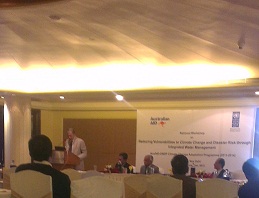
National workshop by UNDP at New Delhi (Image courtesy: Sabita Kaushal)
Introduction to Integrated Water Management
Integrated Water Management (IWM) is a process which promotes the coordinated development and management of water, land and related resources to maximize the resultant economic and social welfare in an equitable manner without compromising the sustainability of vital ecosystems.
Though the proposed version of the National Water Policy 2012 re-emphasises water as an ecosystem service, it does not provide adequate linkages with environmental, natural resources or disaster management policy. This seminar was a well directed step in bringing the focus on IWM approach to mainstream Climate Change Adaptation(CCA)and Disaster Risk Reduction (DRR).
Srinivas Iyer, UNDP welcomed the participants while reiterating the workshop objectives of providing a platform for discussion amongst the stakeholders, identifying national level policies and exploring collaboration opportunities between all concerned.
Challenges faced by vulnerable communities
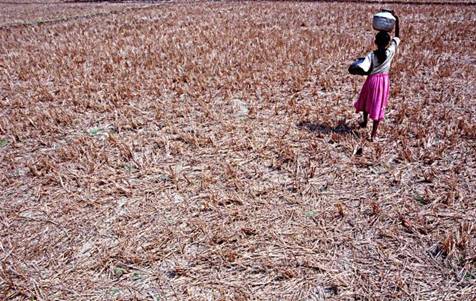
A young girl carrying water during drought in Maharashtra (Image source: wunrn.com)
T Nanda Kumar, Member, NDMA, in his keynote address spoke on how the poor and the marginalised bear the brunt of any disaster. He spoke on the challenges faced by the vulnerable communities and steps taken to overcome them. The key, he believes, lies in incorporating government sponsored programmes at the local level. He said that with the current resources we need to make a model that would be scalable, incorporating in it solutions that are locally innovative.
Linkages between climate change adaptation and disaster risk reduction
Krishna Vatsa, UNDP, began with this presentation and discussed the similarities and the differences between the two. Though both are mutually reinforcing and complementary, and rely upon coping mechanisms and resilience of the people, both view risk in different time frames. The Institutional and Policy Context of CCA and DRR was clarified and the adaptive methods to this phenomenon, which are relevant to India, along with measures to improve resilience at the household level were examined.
Impact of climate change on ground water

Depletion of groundwater in northwestern India between 2002 and 2008 (Image source:jpl.nasa.gov)
This presentation was delivered by Sinha, CGWB. He began by illustrating the principal aquifer system in the country, the regime followed for groundwater monitoring and its present scenario in the country. He then went on to analyze the effect of climate change on groundwater, its quality and the salient points of the Revised Master Plan of Artificial Recharge to Ground Water (2012). Finally the prevailing management strategy in various parts of the country and the mitigation and adaptive measures that need to be adopted , along with the National Water Mission Goals were explained.
Prof. A. K. Gosain , IIT, Delhi, spoke on how information is an integral part of decision making, especially when reworking on policies. As no information on the future is available, his team has used simulations effectively to develop future hydrological models that showcase the changing scenario of the country in terms of factors such as precipitation, water yield , drought weeks etc.
Using readily available data, model outputs were analyzed for various changes. The projected impact on river basin areas and the Madhya Pradesh Action Plan for Climate Change were also addressed and a composite vulnerable index calculated. He concluded by stating that all interventions have an associated impact and for sustainable use of water resources creation of sharable information is essential.
Capacity building in cross sectoral areas related to climate change
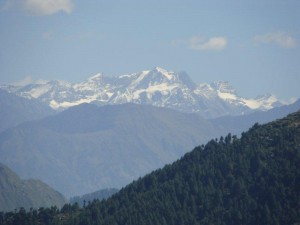
National Mission for Sustaining the Himalayan Ecosystem, NMSHE (Image source: chimalaya.org)
The post lunch session was opened by Nisha Mendiratta, Ministry of Science & Technology. She spoke on the 4th Assessment Report of the Intergovernmental Panel on Climate Change(IPCC) and its relevant scientific, technical and socio-economic information on climate change. She re iterated the fact that climate change impacts are becoming more and more visible as seen by the yearly rising of the sea level.
She spoke about the role of NMSHE (National Mission for Sustaining the Himalayan Ecosystem) and its implementation through coordinated actions. She stressed on the involvement of stakeholders in this process especially at the grassroot level. Initiatives under National Mission on Strategic Knowledge for Climate Change (NMSKCC), including launch of centres of excellence and knowledge networks, were also elaborated by her.
Application of the climate information and prediction in the water sector
Dr KD Sharma, National Rainfed Area Authority, attempted to analyze connections between the scientific ability to predict climate and the opportunity to incorporate such understanding into decisions on issues faced by water resources managers. These predictions need to be spatially and temporarily explicit to benefit decision making.
He then went on to share some guiding principles to improve the decision making processes along with tools dealing with uncertainty due to climate change. He concluded that for managing unpredictable future changes we need to put in place a water resources infrastructure and management system, designed and operated to be more flexible and adaptive.
Promoting sustainable agriculture and food security in Asia
Krishnan Raghavan, UN APCTT-EDCAP, presentation was an introduction to their project SATNET Asia, a project that uses Innovation Network for food security and poverty reduction. Speaking on poverty and farmers, he discussed how SATNET Asia will act as an enabling platform for marginal farmers and empower them with access to knowledge and information. He explained the key processes of the project –skill enhancements, access to knowledge and sustainable techniques.
Pilot projects of UNDP
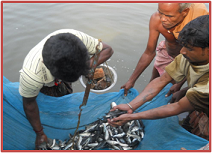
'Reducing vulnerabilities of communities though IWM' in Odissa (Image courtesy : Bimal Pandia, RCDC)
The post tea session threw light on two pilot projects in Madhya Pradesh and Odisha , a collaboration of AUSAID and UNDP, giving details and progress of the work carried out there. Bimal Pandia, RCDC, spoke on how his project area is part of Mahanadi river delta, with water draining to sea via Chilika lake. Citing concrete examples of severe flooding, rapid sedimentation, he brought home the climate linked problems in the area. He then spoke on the community mobilization initiatives, the activities strengthening livelihoods undertaken by them and the challenges they faced.
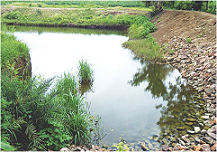
Water and climate change vulnerability in Dewas, MP ( Image courtesy: PS Vijayshankar)
P.S. Vijayshankar gave a presentation on the progress of his pilot project in West Nimar District, MP. Supported by data on rainfed drylands of India, he focused on the climate change induced challenges. The focal for water resilient agriculture , he stated was water. The critical problem lies in receiving the complete yearly volume of rain, in a limited period of time, and the challenge is to make this 50-day water available throughout the year. He spoke on the program followed, the progress made and the water security plan advocated.
India-WRIS: A comprehensive , credible & contextual view of India's water resources data
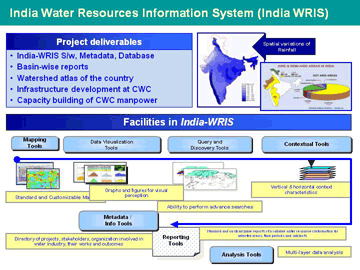
Water Resource Information System of India (Image source: isro.org)
The final talk on Water Resource Information System of India ( India- WRIS) was given by Prof Sharma accompanied with his young team . He gave a live demonstration of India-WRIS WebGIS website http://www.india-wris.nrsc.gov.in/. This site aims as a ‘Single Window’ solution for comprehensive, authoritative and consistent data & information of India’s water resources along with allied natural resources.
It can be used to search, access, visualize, understand and analyze data for assessment, monitoring, planning, development and finally Integrated Water Resources Management (IWRM). It’s a 2 way interactive system; designed to look at the variety of users and their requirements, and its mobile version is to be launched in the near future.
The workshop concluded by a formal vote of thanks by G Padmanabhan, UNDP.
/articles/event-report-national-workshop-organised-undp-reducing-vulnerabilities-climate-change-and